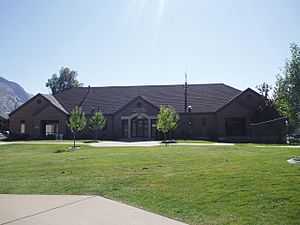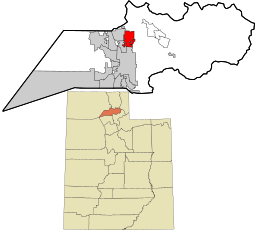North Ogden, Utah facts for kids
Quick facts for kids
North Ogden, Utah
Opecarry
|
|
|---|---|

City hall
|
|

Location in Weber County and the state of Utah
|
|
| Country | United States |
| State | Utah |
| County | Weber |
| Settled | 1850 |
| Incorporated | 1934 |
| Named for | Peter Skene Ogden |
| Area | |
| • Total | 7.51 sq mi (19.44 km2) |
| • Land | 7.50 sq mi (19.44 km2) |
| • Water | 0.00 sq mi (0.01 km2) |
| Elevation | 4,613 ft (1,406 m) |
| Population
(2020)
|
|
| • Total | 20,916 |
| • Density | 2,788.8/sq mi (1,075.9/km2) |
| Time zone | UTC-7 (Mountain (MST)) |
| • Summer (DST) | UTC-6 (MDT) |
| ZIP codes |
84404, 84414
|
| Area code(s) | 385, 801 |
| FIPS code | 49-55100 |
| GNIS feature ID | 2411275 |
North Ogden is a city located in Weber County, Utah, in the United States. In 2020, about 20,916 people lived there. North Ogden is found on SR-235, just three miles north of Ogden. It is a smaller town that is part of the larger Ogden-Clearfield metropolitan area.
Contents
Exploring North Ogden's Past
The first people to live in the North Ogden area were the Shoshone people. They called this area “Opecarry,” which means “stick in the head.”
Early Settlers and Challenges
European-American settlers arrived in North Ogden in the winter of 1850. Two groups of cattle ranchers from Ogden, the Campbells and the Riddles, came to the area. They had been told by Brigham Young to stay near the fort in Ogden because of issues with the local Shoshone.
After a few months, the ranchers had to go back to Ogden because they were worried about the Shoshone. The next year, in 1851, some of the issues with the Shoshone were resolved. Jonathan Campbell then returned with other families to make North Ogden their permanent home.
Growing Industries and Community Life
In the mid to late 1800s, the sugar beet industry became very important. A factory was built in North Ogden to process and can sugar beets. David Ephriam Randall owned this canning plant.
North Ogden also got a special train track, called the "Dummy Line," which connected it to the Union Pacific Station in Ogden. Large fruit farms grew, and their harvests became a main source of income for the community. The North Ogden Fruit Exchange was started in 1924. This was the first fruit cooperative in the area, and it used the railroad to sell fruit across different states.
Becoming an Official City
In the 1930s, more people needed water. Because of this, the city officially became incorporated on February 1, 1934. David Gilbert Randall was chosen as the first mayor and served for ten years.
During the same decade, the city started its "Cherry Days" celebration on July 4th. After World War II, North Ogden grew a lot. It became a main suburb for Ogden and other bigger cities. The old industries became less important, and many farms were divided into plots for new homes.
Honoring a Mayor
On November 3, 2018, the mayor of North Ogden, Brent R. Taylor, was killed while serving in Afghanistan with the National Guard. He had taken time off from his mayoral duties to serve his country.
Every year, a large American flag is hung in the air above Coldwater Canyon. This is done to honor Mayor Taylor and all the Veterans of the United States Armed Forces.
North Ogden's Location and Landscape
North Ogden covers an area of about 6.5 square miles (16.8 square kilometers), and all of it is land.
The city is located at the bottom of Ben Lomond Peak. This is a very tall and noticeable mountain that is part of the Wasatch Front. You can even see it from the Salt Lake Airport.
North Ogden's Population Over Time
| Historical population | |||
|---|---|---|---|
| Census | Pop. | %± | |
| 1870 | 683 | — | |
| 1880 | 956 | 40.0% | |
| 1890 | 758 | −20.7% | |
| 1900 | 850 | 12.1% | |
| 1910 | 579 | −31.9% | |
| 1920 | 1,004 | 73.4% | |
| 1930 | 1,045 | 4.1% | |
| 1940 | 687 | −34.3% | |
| 1950 | 1,105 | 60.8% | |
| 1960 | 2,621 | 137.2% | |
| 1970 | 5,257 | 100.6% | |
| 1980 | 9,309 | 77.1% | |
| 1990 | 11,668 | 25.3% | |
| 2000 | 15,026 | 28.8% | |
| 2010 | 17,357 | 15.5% | |
| 2020 | 20,916 | 20.5% | |
| U.S. Decennial Census | |||
In 2010, there were 17,357 people living in North Ogden. The city had 5,569 households and 4,633 families. The population density was about 2,310 people per square mile (892 people per square kilometer).
Most of the people in the city were White (94.3%). About 5.4% of the population identified as Hispanic or Latino.
Many households had children under 18 living with them (39.6%). Most households were married couples (71.2%). The average household had about 3.40 people. The average family had about 3.68 people.
The median age in the city was 32.9 years. About 31.4% of the population was under 18 years old.
Well-Known People from North Ogden
North Ogden has been home to several notable individuals:
- Julia Bachison – She was crowned Miss Utah in 2005.
- Leanne Barrette – A professional bowler who is in the USBC and PWBA Halls of Fame.
- Blair Buswell – A sculptor who has created works for the Pro Football Hall of Fame since 1983.
- Dee Hock – The person who founded and was the first CEO of the Visa credit card association.
- Nick Howell – A college football coach who started in 2008.
- Kelsey Nixon – Known from the Food Network.
- Bill Orton – A U.S. Congressman.
- Brent R. Taylor – He served as the mayor of North Ogden and was also an officer in the United States Army.
How North Ogden is Represented in Government
North Ogden is part of Utah's First Congressional District. For the 118th United States Congress, this district is represented by Blake Moore, who is a Republican from Salt Lake City.
See also
 In Spanish: North Ogden (Utah) para niños
In Spanish: North Ogden (Utah) para niños
 | Aurelia Browder |
 | Nannie Helen Burroughs |
 | Michelle Alexander |

